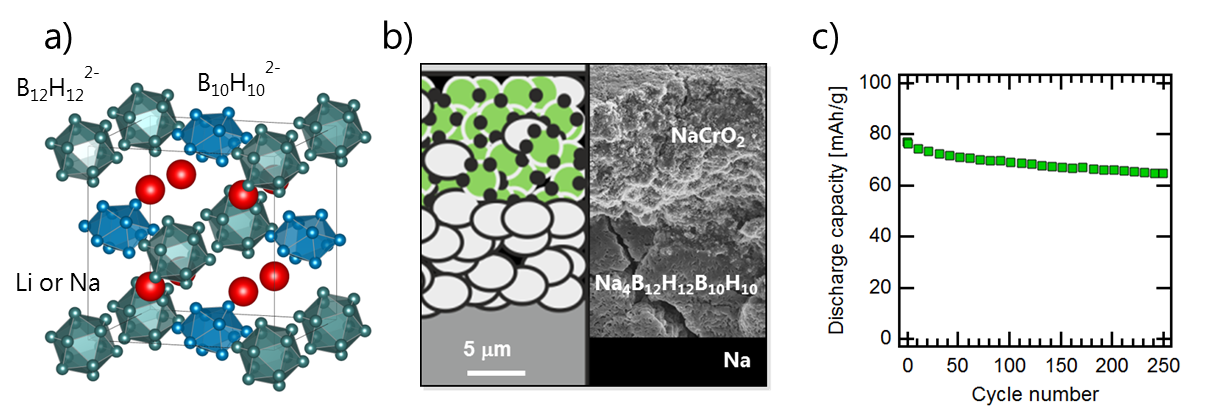All-solid-state batteries
All-solid-state batteries replacing the flammable liquid electrolyte by a non-flammable solid electrolyte promise significantly enhanced energy density (e.g. by enabling lithium-metal anodes and high-voltage cathodes), fast charging capabilities (e.g. by tolerating higher operating temperatures), and improved operational safety (e.g. by eliminating flammable components). These advantages render all-solid-state batteries very attractive for automotive companies. The dependency of European automotive manufacturers, which contribute substantially to Europe’s economic strength, on batteries from Asia is a major concern also for the European Commission. Consequently the European Commission considers all-solid-state batteries as a pathway to re-establish strong cell manufacturing in Europe. However, there exists currently no all-solid-state battery technology that can compete in terms of performance with today’s lithium-ion batteries.

We developed a non-flammable non-toxic solid electrolyte for all-solid-state batteries based on a novel class of inorganic borate electrolytes offering simultaneously high ionic conductivity (1 mS/cm at 25°C) and a wide electrochemical stability window (>3 V). We successfully demonstrated a 3 V-class battery cell with a sodium metal anode and NaCrO2 cathode achieving remarkable capacity retention of 85% after 250 cycles to 3.2 V. Our results bring this material class to a technology readiness level comparable to the heavily investigated oxide- and sulfide-based solid-state electrolytes investigated intensively e.g. by Samsung, Toyota, VW, etc.
Funding
Swiss National Science Foundation, InnoSuisse, Swiss State Secretariat for Education, Research, and Innovation, Polish-Swiss Research Programme, Horizon 2020


[1] L. Duchêne, A. Remhof, H. Hagemann, C. Battaglia, Status and prospects of hydroborate electrolytes for all-solid-state batteries, Energy Storage Mater. 2020, 25, 782
[2] L. Duchêne, D. H. Kim, Y. B. Song, S. Jun, R. Moury, A. Remhof, H. Hagemann, Y. S. Jung, C. Battaglia, Crystallzation of closo-borate electrolytes from solution enabling infiltration into slurry-casted porous electrodes for all-solid-state batteries, Energy Storage Mater. 2020, 26, 543
[3] R. Asakura, L. Duchêne, R.-S. Kühnel, A. Remhof, C. Battaglia, Electrochemical oxidative stability of hydroborate solid-state electrolytes, ACS Appl. Energy Mater. 2019, 2, 6924.
[4] L. Duchêne, S. Lunghammer, T. Burankova, W.-C. Liao, J. P. Embs, C. Copéret, H. M. R. Wilkening, A. Remhof, H. Hagemann, C. Battaglia, Ionic conduction mechanism in the Na2(B12H12)0.5(B10H10)0.5 closo-borate solid-state electrolyte: interplay of disorder and ion-ion interactions, Chem. Mater. 2019, 31, 3449.
[5] L. Duchêne, R.-S. Kühnel, E. Stilp, E. Cuervo Reyes, A. Remhof, H. Hagemann, C. Battaglia, A stable 3 V all-solid-state sodium–ion battery based on a closo-borate electrolyte, Energy Environ. Science 2017, 10, 2609.
[6] Y. Yan, R.-S. Kühnel, A. Remhof, L. Duchêne, E. Cuevo Reyes, D. Rentsch, Z. Lodziana, C. Battaglia, A lithium amide-borohydride solid-state electrolyte with lithium-ion conductivities comparable to liquid electrolytes, Adv. Energy Mater. 2017, 7, 1700294.
[7] E. Roedern, R.-S. Kühnel, A. Remhof, C. Battaglia, Magnesium ethylenediamine borohydride as solid-state electrolyte for magnesium batteries, Scientific Reports 2017, 7, 46189.
New generation of solid state batteries, Empa & UniGe press release, 23.11.2017 (deutsch, français, English)
Sodium and magnesium to replace lithium in batteries, Swiss National Science Foundation press release, 2.5.2018 (deutsch, français, English)
A liquid approach to solid-state batteries, Empa & UniGe press release, 25.1.2019 (deutsch, français, English)
Solid state batteries for tomorrow's electric cars, Empa & Fraunhofer press release, 22.2.2019 (English)
Battery research award for Empa researcher, Empa press release, 16.10.2019, (English)
-
Share
